The story of Mark Jones, Dominic Lucci, and Kenny Gardiner, three Army veterans, highlights a chilling reality within the American justice system: wrongful convictions. Their ordeal began on a seemingly ordinary night in January 1992, an evening that would irrevocably alter their lives. A chance encounter with a police officer led to their arrest for a murder they did not commit, resulting in a combined 78 years of wrongful imprisonment. This narrative, detailed in John Grisham’s non-fiction work “Framed,” serves as a stark reminder of the systemic flaws that can lead to the conviction of innocent individuals, a problem exacerbated by factors like racial bias and insufficient resources for the defense. Their case, along with others documented in the book, reveals the devastating human cost of a justice system prone to error.
Wrongful Conviction: The Case of the Savannah 3
The Night of the Arrest
On January 31, 1992, Jones, Lucci, and Gardiner, all in their early twenties, attended a wedding rehearsal. Later, they embarked on an impromptu bachelor party, seeking out a nightclub in Savannah, Georgia. Their journey involved multiple requests for directions from police officers, a seemingly innocuous act that would become pivotal in their wrongful conviction. Unbeknownst to them, a drive-by shooting had occurred nearby. Their interactions with law enforcement, specifically a request for directions near the crime scene, tragically led to their identification as suspects by an eyewitness who mistook them for the perpetrators. Their arrest followed hours later. Lacking any criminal history and with no connection to the victim, their predicament exemplified the chilling phrase, “wrong place, wrong time.” The absence of a murder weapon further undermined the prosecution’s case.
The Trial and Conviction
Despite a lack of substantial evidence, the trial painted the three veterans as racist and thrill-seeking, leveraging existing racial tensions within Savannah to shape public and jury perception. The eyewitness, James White, identified two of the men. After 8 hours and 20 minutes of deliberation, the jury delivered a guilty verdict. The conviction came with life imprisonment plus an additional five years, a sentence the trio grappled to comprehend in its full weight and implications. The speed of their conviction highlighted potential systemic bias, an alarming tendency in the justice system that can tragically override justice itself.
The Fight for Freedom and the Role of Centurion Ministries
The Long Road to Exoneration
Following their conviction, the Savannah 3’s arduous journey to freedom began. They tirelessly sought legal recourse and support. Their case ultimately reached Centurion Ministries, a non-profit organization dedicated to freeing the wrongfully convicted. Jim McCloskey and his team at Centurion took on their case in 2009, embarking on a years-long battle to overturn the unjust conviction. The process involved meticulous investigation and legal maneuvering, overcoming significant obstacles in a system designed for punishment, not rectification of error.
Centurion’s Role in Exposing Systemic Issues
Centurion’s involvement is far more than simply securing the release of innocent people; they are fighting systemic failures within the justice system. The organization’s success with the Savannah 3’s case exposed the flaws in eyewitness testimony, the impact of racial bias on justice, and the necessity of ensuring that due process and fairness are equally applied across demographics and economic strata. Centurion plays a pivotal role, shining a light on often ignored victims, a spotlight far beyond just securing their freedom, but pushing for necessary systemic reforms. Their dedication reveals a disturbing and persistent reality in the American legal system: a far too easily reached outcome of erroneous convictions which often unjustly victimize poor and marginalized communities.
The Aftermath and Lasting Impacts
Life After Prison
After 26 years of wrongful imprisonment, the Savannah 3 were finally exonerated in December 2017. The Georgia Supreme Court ruling cited the state’s failure to produce crucial evidence during their original trial. Despite their freedom, they carry the lasting scars of their ordeal. While financial compensation partially addressed the financial setbacks, they faced insurmountable loss – years of education, family experiences, career building – and enduring the trauma of wrongful imprisonment. The psychological and emotional burdens remain even after their release. Though reunited and supportive of each other, they will always bear the marks of their unjust experience.
The Broader Implications
The Savannah 3’s case is far from isolated. John Grisham and Jim McCloskey’s “Framed” highlights the prevalence of wrongful convictions across the United States, demonstrating that these cases are systemic issues of severe magnitude. This book draws the reader’s attention to similar situations and underscores the vulnerabilities that exist within a flawed system. The authors aim to spark discussions on the importance of reforming justice mechanisms and pushing for preventative measures to diminish wrongful convictions, working towards a legal system that embodies its most central tenet: ensuring justice for all. The frequency with which it fails must never be dismissed.
Takeaway Points
- Wrongful convictions are a significant problem within the American justice system, disproportionately affecting people of color and indigent individuals.
- Eyewitness misidentification, prosecutorial misconduct, and racial bias contribute to wrongful convictions.
- Organizations like Centurion Ministries play a critical role in freeing the wrongly convicted and advocating for criminal justice reform.
- The emotional, psychological, and financial consequences of wrongful convictions are devastating and long-lasting.
- Ongoing reforms are crucial to address the systemic issues within the American justice system that enable these travesties to occur.









